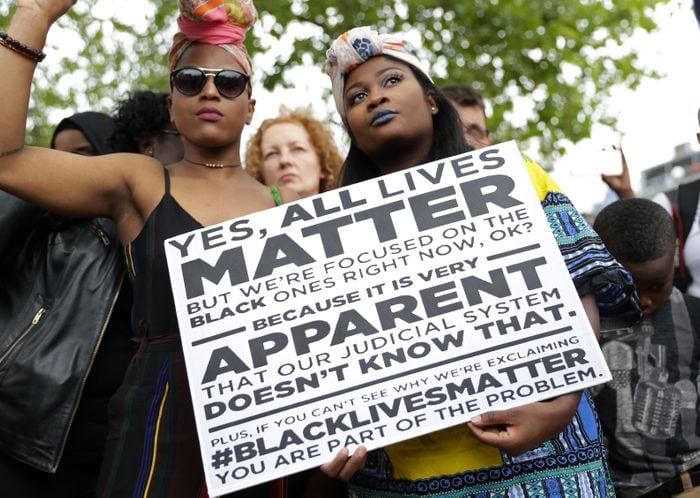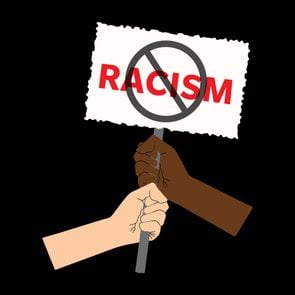How to Respond When Someone Says “All Lives Matter”
Updated: Nov. 24, 2022

Conversations about race are difficult even in the best of times. But over this past contentious year, Americans—both White and BIPOC—have argued over different perspectives on race relations, including whether Critical Race Theory should be taught in schools, how prevalent institutional racism actually is, whether there can be voting-rights restrictions, and the idea of police reform. But few issues are more polarizing than the language people use in their conversations about how to stop racism or whether racism even exists. That’s why you’ve probably heard the slogan “Black Lives Matter” countered with the phrase “All Lives Matter.”
But that response is not only insensitive—it is also completely off-point and lacks historical context, explains David W. Campt, PhD, an expert in cultural competence and the founder of The Dialogue Company. “Of course all lives matter,” he explains. “The reason that I say Black Lives Matter is because, historically, the sad fact is that all lives haven’t mattered equally. That is why I and others are pointing out that Black lives matter also.”
For further context, look at the founding of this country, says Matthew Harper, PhD, an associate professor of History and Africana Studies at Mercer University in Macon, Georgia. The Declaration of Independence may have had some lofty ideals of all men being created equal, he notes, but it was written by a man who enslaved 200 Black people. And many constitutional amendments applied only to White people for a very long time. That’s why Harper suggests affirming the statement that all lives do matter and then following up with: “I’m OK with you saying that if it’s not being used to avoid saying Black Lives Matter. Let’s say All Lives Matter and Black Lives Matter.'”
That’s just one of the many comments you may hear and want to respond to in an appropriate and productive way. Here’s how to have calm, productive exchanges, according to our experts. You might also want to listen to these podcasts about race for more tips and a greater understanding of the impact of Black Lives Matter.
“What about Blue lives? Don’t they matter?”
This is another common response to affirmations that Black lives matter. It’s a false equivalence offered, purportedly, in defense of police officers whose actions are being called into question more often as the shootings of unarmed Black men mount nationwide. But, as Campt points out, people choose to become police officers. No one chooses their racial identity.
He suggests responding to that question with an affirmation and a parallel statement like this: “Of course police officers’ lives matter. Doctors’ lives matter, too. Everybody’s lives matter. But we’re not talking about whether people are injured in the course of professions they choose. We’re talking about whether they are injured in the course of just being who they are.”
Meanwhile, Harper points out that the value of police officers’ lives has never been questioned in the United States, so a response should reflect that. “I would say, ‘Absolutely, of course—police put themselves on the line. Their jobs are very dangerous and very difficult. Of course they matter. And one of the ways our society already shows that we value Blue lives is that we give some of the harshest penalties to anyone who kills or harms a police officer. So, we, as a society, already agree that Blue lives matter. The question is, do people who kill Black civilians face the same kinds of penalties?”
“Black Lives Matter is divisive”
Harper puts it simply: We should be upset when police kill unarmed Black people. Full stop. “If it’s divisive, it shows that we have a real big problem in our society,” he says. “It means that, on some level, a good number of us think that Black lives—or at least certain Black lives—are disposable.” To counter this statement, he suggests saying: “It’s only divisive if we don’t think that Black lives matter. It’s actually a very modest claim. All it says is these people who are being killed deserve not to be killed.”
Campt believes one reason people don’t get the intended point of Black Lives Matter is that they are either uncomfortable with the wording or just don’t accept that racism is a problem. So, instead of defending the statement, he suggests challenging the premise by pointing out counter examples and asking a question that prompts further discussion. “I would say, ‘When people say, ‘Save the babies,’ other people don’t say, ‘That’s divisive because you’re not talking about saving the old people,'” says Campt. “The question is, ‘Why do you find it divisive?'”
“What about Black-on-Black murder?”
People often argue that if Black Lives Matter is about Black people being killed by police, there should be more outrage over the killings of Black people by other Black people. But this argument falls apart immediately once you really look at it, says Harper. He points out that most murders in the United States are committed intraracially—whether we’re talking about Black, White, Hispanic, or Native American people. People are, for the most part, murdered by members of their own racial groups because our families, neighborhoods, and social groups are largely segregated.
Also, when it comes to the Black community, in particular, there’s another layer to unpack. “I don’t think you’d find people in Black communities unconcerned about the level of violent crime that they might be experiencing,” Harper says. “It’s just that that violent crime is one of the consequences of systemic racism, just like the bias that Black people face from police shootings and vigilante shootings. They’re two symptoms of the same disease.”
Here’s what he suggests as a response: “The devaluation of Black lives is something that happens in lots of different arenas. It’s not just between a police officer and a Black civilian. It can happen between Black people. It can happen in the way that our society takes opportunities away from Black neighborhoods and makes them more vulnerable to violence. And we can oppose police brutality and murder at the same time. There’s no conflict.”
Campt, on the other hand, believes that these two different types of violence evoke different responses due to what’s at the root of each. An unnecessary Black death caused by another Black citizen is obviously received with anger and sadness. But an unnecessary and seemingly racially motivated killing of a Black person by a police officer comes across as something much bigger—a violation of the community’s social contract with the government. That’s why certain deaths, like those of George Floyd and Eric Garner, have more significance to us collectively than others. He suggests countering the “Black-on-Black murder” argument by noting that the people who are saying that Black lives matter are often the same people who have been fighting against violence in the Black community for a long time…but that Black Lives Matter is about the special problem of seemingly state-sanctioned violence against Black people.
“All Lives Matter is an inclusive statement”
Sadly, “All Lives Matter” is not a reality in a country where empirical evidence shows otherwise. Racial health disparities, for example, lead to more instances of poor health outcomes, including death, for African Americans. Doctors’ implicit biases can negatively affect the quality of care they provide for Black people. Race-based differences in education can leave Black students undereducated and with limited career opportunities. And the racial wealth gap cuts off African Americans from many of life’s necessities and opportunities, according to economists. Even the daily microaggressions Black people experience take a toll on their psyches.
Given the fact that there are so many glaring racial disparities in the country, Harper maintains that saying “All Lives Matter is an inclusive statement” is just a tactic to block a necessary conversation about persistent racism in the United States. He suggests countering this claim by saying that in order for the statement to be truly inclusive, it has to be followed up by Black Lives Matter. Otherwise, it simply isn’t accurate. Campt adds that another smart tactic is asking if All Lives Matter puts a spotlight on the particular problems that have resulted in Black people having shorter life expectancies, fewer resources, and fewer opportunities than people of other races; it’s a way to crystalize the point that Black people simply want their lives to matter as much as other people’s lives.
“The country is changing too quickly”
It’s not the pace of change that matters here—it’s the quality of the change. And that’s exactly how you want to steer the conversation if you hear this statement. Harper says, “I would want to ask, ‘What’s changing too quickly? Can we too quickly move toward justice? Can we too quickly move toward wholeness and healing? Can we talk about the quality of change? What do we want to see as a country?'”
Allies can also drive conversations about race forward by acknowledging and identifying with the source of people’s anger when it comes to racial issues. For example, Campt says he might explain that even he, a Black man, sometimes gets frustrated in certain situations, like when he’s trying to converse with someone who doesn’t speak English. By talking about your own struggles with racism and implicit bias, you can connect in a deeper way instead of talking down to the other person. You’re basically saying: If I’m working it, you can work on it, too—we’re all in this together. And that, Campt says, “is a whole different kind of conversation.”
Discussions about race
Change isn’t easy, and allies need to make a concerted effort to help it along. That’s why Harper believes that White people should educate themselves about issues of race and then discuss them with other White people. Why? Because Black people often aren’t in the same spaces and don’t have the opportunity to have these discussions with them. He acknowledges that White people often find it difficult to talk about race, so they avoid the topic, particularly if they don’t know the perspectives of the other people in the conversation.
“I think, as a White person,” he says, “the least that I can do when Black people are dying from racism is to experience the discomfort of having the conversation with another White person about racism.” In the process, you might realize you’ve been unintentionally harboring racist views or be able to help someone else change their perspective. Either way, it’s important and necessary to make the effort.
Sources:
- David W. Campt, PhD, an expert in cultural competence and racial dialogue and the founder of The Dialogue Company
- Matthew Harper, PhD, an associate professor of History and Africana Studies at Mercer University
- New York Times: “Still Separate, Still Unequal: Teaching about School Segregation and Educational Inequality”
- Forbes: “Here’s What The Racial Wealth Gap In America Looks Like Today”
- The Atlantic: “Being Black in America Can Be Hazardous to Your Health”
- MSN: “Racial microaggressions take a major toll on Black Americans”


